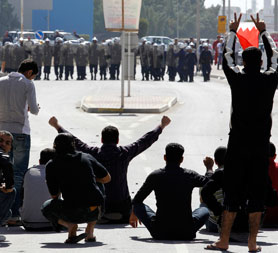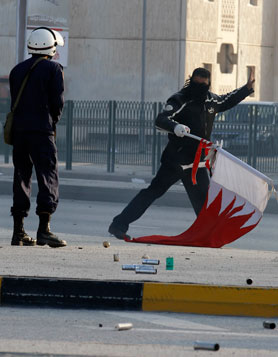Middle East unrest spreads as protesters clash with police
Police fire tear gas to disperse protests in Bahrain and Iran as unrest spreads following the Egyptian revolt. In Cairo protesters are urged to return to work following President Mubarak’s downfall.

As the protests hit Bahrain and Iran, the temporary governments in place in Tunisia and Egypt – where protests have overthrown the leaders over the last few weeks – began taking steps to restore normality and to assert themselves on the global stage.
The Egyptian authorities have asked protesters to return to work and have also requested that the assets of former officials be frozen in countries including Britain. In Tunisia, the caretaker Government entered into a dispute with Italy over migration.
Bahrain
But in countries including Bahrain, the protests continue.
Police cracked down on protesters on Monday in Bahrain as the government tightened security in the Gulf island state for an opposition “Day of Rage” inspired by upheaval in Egypt and Tunisia.
Protesters took to the streets waving flags while helicopters circled over the capital Manama.
At least 14 people were wounded in clashes in three villages overnight and on Monday and police broke up at least one protest with tear gas and rubber bullets. Footage emerged on the internet of riot police firing tear gas at crowds of protesters, who appeared to be marching through the streets on Sunday night.
A number of photos and videos were posted on the internet showing people with injuries reportedly sustained in the clashes. More than 20 people were hurt in village clashes, according to reports.
Eye witnesses said on Monday that roads in the capital had been blocked to stop demonstrators gathering.
Bahrain, where a Sunni family rules over a Shi’ite majority, has offered cash payouts in the run-up to the protest, in a move that appears to be aimed at preventing Shi’ite discontent from bubbling over as popular revolts spread in the Middle East.
In the village of Diraz, authorities dispersed with tear gas about 100 Shi’ite protesters who had squared off with police, shouting slogans demanding more political rights.
“We don’t want to overthrow the ruling family, we just want to have our say,” said Ali Jassem, married to a daughter of Sheikh Issa Qassem, a powerful Bahrain Shi’ite cleric.
Diplomats say Bahrain’s demonstrations, organised on Facebook and Twitter, will gauge whether a larger base of Shi’ites can be drawn to the streets. The big test will be if protests take hold in Manama, where demonstrations are rare.
Iran protests
As unrest appeared to be spreading after President Hosni Mubarak stepped down from power last week, protesters also clashed with security forces in Iran.

In the capital Tehran security forces fired tear gas to scatter thousands of people marching in a rally which had earlier been banned.
“There are thousands of people marching,” a witness said. “Security forces fired tear gas to disperse them near Imam Hossein square.”
The march was a test of strength for the reformist opposition, which had not taken to the streets since December 2009, when eight people were killed. But Iranian security forces are still unlikely to hesitate to use any means to stop protests.
Large numbers of police and security forces wearing riot gear were stationed around the main squares of the capital and travelling in pairs on motorbikes around the city.
There were minor clashes at some points across the sprawling capital city of some 12 million people, witnesses said. Mobile telephone connections were down in the area of the protests.
Egyptians urged to return to work
In Cairo’s Tahrir Square – which became the focus for the Egyptian revolution – military police and soldiers struggled to clear anti-Government protesters on Monday, following President Mubarak’s downfall.
Traffic around the square has begun to flow again after weeks of unrest in the capital but was soon stopped again as protesters returned.
Hundreds of police marched through the square, unhindered by troops, saying they wanted to show solidarity with the revolution. The marchers joined a growing wave of protests and strikes as Egyptians used their new-found freedom to vent their anger at the country’s political system.
The Egyptian military on Monday called for national solidarity and urged workers to play their role in reviving the economy after weeks of strike action.
Egypt has asked Britain to freeze the assets of several former officials.
Foreign Secretary William Hague said: “We have also received a request from the Egyptian government to freeze the assets of several former Egyptian officials. We will of course co-operate with this request, working with EU and international partners as we have done in the case of Tunisia.
He also said the Egyptian Prime Minister had told him opposition figures would be included in the country’s reshuffled cabinet in the next week.
“I encourage the Egyptian government to make further moves to accommodate the views of opposition figures and was pleased to hear from Prime Minister (Ahmed) Shafiq that members of the opposition should be included in a reshuffled cabinet during the next week,” he said.
Tunisia migrant row
In Tunisia where the unrest began in December, the authorities have accused Rome of infringing on its sovereignty after an Italian Minister suggested sending police to the north African country to stem the tide of illegal migrants trying to reach Italy.
More than 4,000 migrants have crossed the sea from Tunisia to the small Italian island of Lampedusa in the past week, underscoring the lingering instability in Tunisia since protests ousted its President a month ago.
Baroness Ashton, the European Union’s foreign policy chief, expressed support for Tunisia’s caretaker administration after talks in Tunis, and Italian Foreign Minister Franco Frattini was scheduled to arrive later in the day.
Tunisian protesters unseated authoritarian ruler Zine al-Abidine Ben Ali after 23 years in power, in an uprising that served as an inspiration for the revolt in Egypt which on Friday forced President Hosni Mubarak to resign.
-
Latest news
-
Windrush scandal: returning to the UK after a forty year wait6m

-
Netanyahu ‘survival’ depends on ‘expanding war’ says head of Palestinian National Initiative5m

-
Proposed law change could strip parental rights from paedophiles5m

-
Hugh Grant settles privacy lawsuit against The Sun newspaper publisher2m

-
Post Office Scandal: what did top executive know?6m

-




